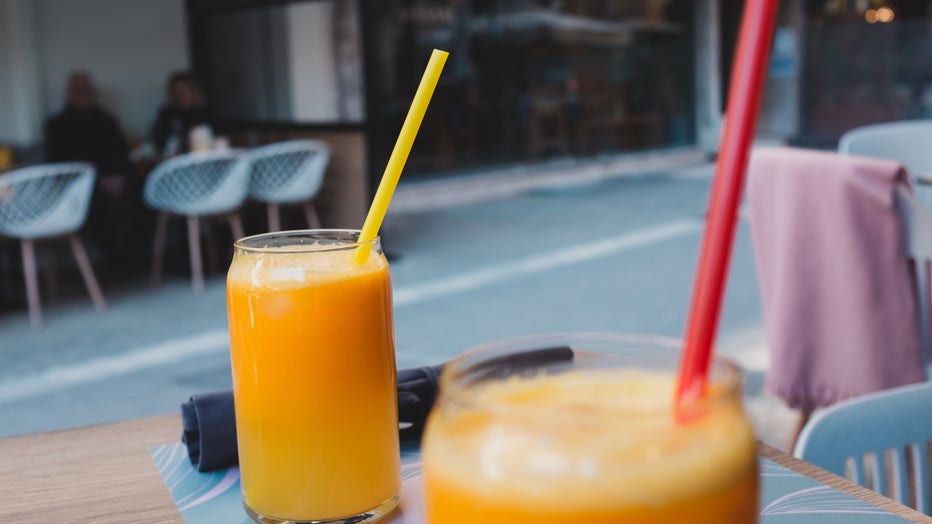Orange juice is linked to surprising health benefits, study finds
Pure orange juice might have some unexpected benefits.
Researchers from Toronto Metropolitan University researched the effects of drinking 100% orange juice compared to a sugar-sweetened beverage (SSB), or "orange drink," on appetite, food intake and glycemic response in adults.
The study was funded by the Florida Department of Citrus. It was published in the journal Nutrients and also surveyed emotions and sensory characteristics associated with the beverage.
Thirty-six "normal weight" adults were tasked with drinking either 100% orange juice, an orange drink or water before eating.
The researchers found that food and energy intake was lower in subjects who drank 100% orange juice compared to the orange drink.
Caloric compensation from 100% orange juice was 84%, while the orange drink was −25%.
(Caloric compensation is the "regulation of energy intake by adjusting one's intake based on previous consumption," according to the National Institutes of Health.)
There was no significant difference in average appetite between the beverages, but blood glucose levels were lower after people drank the 100% orange juice.
"Rest-of-day blood glucose concentrations were lower after 100% orange juice compared with the orange drink and water control," the study stated.
"In conclusion, consumption of 100% orange juice as a preload resulted in higher caloric compensation, lower total daily EI [energy intake], and lower blood glucose concentrations compared to the orange drink."

A glass of fresh orange juice is sitting in Larissa, Greece, on March 26, 2024. (Photo by Nikolas Kokovlis/NurPhoto via Getty Images)
Study co-author Nick Bellissimo, associate professor of nutritional physiology at Toronto Metropolitan University, reacted to the findings in a statement to Fox News Digital.
While a "number of dietary guidelines" recommend reducing sugar intake from "all sources," Bellissimo said, the findings suggested that 100% orange juice can be beneficial.
"Orange juice is similar to a sugar-sweetened beverage in that it contains free sugars, but it also contains sucrose (fructose and glucose bound together), while also containing vitamin C and flavonoids," he noted.
The researchers’ hypothesis was that flavonoids in orange juice slow down the digestion and absorption of sugar.
"Thus, you are not seeing the same spike in blood glucose as you see with the SSB," Bellissimo said.
"Interestingly, the energy in the orange juice was compensated for at the next meal – i.e., participants decreased their food intake at lunch by an amount similar to the energy in the orange juice – whereas participants ate more calories at lunch after consuming the SSB."
Bellissimo confirmed that this effect on energy intake and glycemic response "persisted for the rest of the day."
"And participants consuming the orange juice actually consumed fewer calories, primarily by decreasing their carbohydrate intake," he said.
"A little bit of orange seems to go a long way," Bellissimo added.
Ilana Muhlstein, a registered dietitian and nutritionist in Los Angeles, was not involved in the study but shared her thoughts on the study with Fox News Digital.
"The most important finding of the entire study is that the blood glucose concentrations were lower after 100% orange juice compared with an orange drink of the same calories, which shows that the body can recognize a difference between natural sugars and added sugars," she said.
As a dietitian, Muhlstein said she is "constantly encouraging people to drink water," especially prior to their meals, just as done in the study.
"It’s important to note that drinking water has a meaningful impact on lowering blood sugar levels," she also pointed out.
"If someone wanted to drink orange juice, I would encourage them to stick with 100% orange juice, versus an ‘orange drink’ sweetened with sugar, and do their best to mix it with some water for a more positive blood sugar result."
Fox News Digital reached out to the Florida Department of Citrus for comment.

